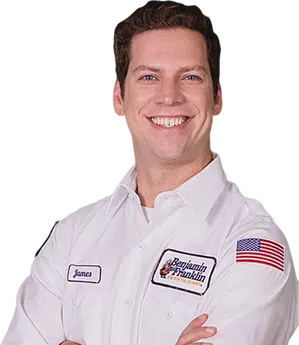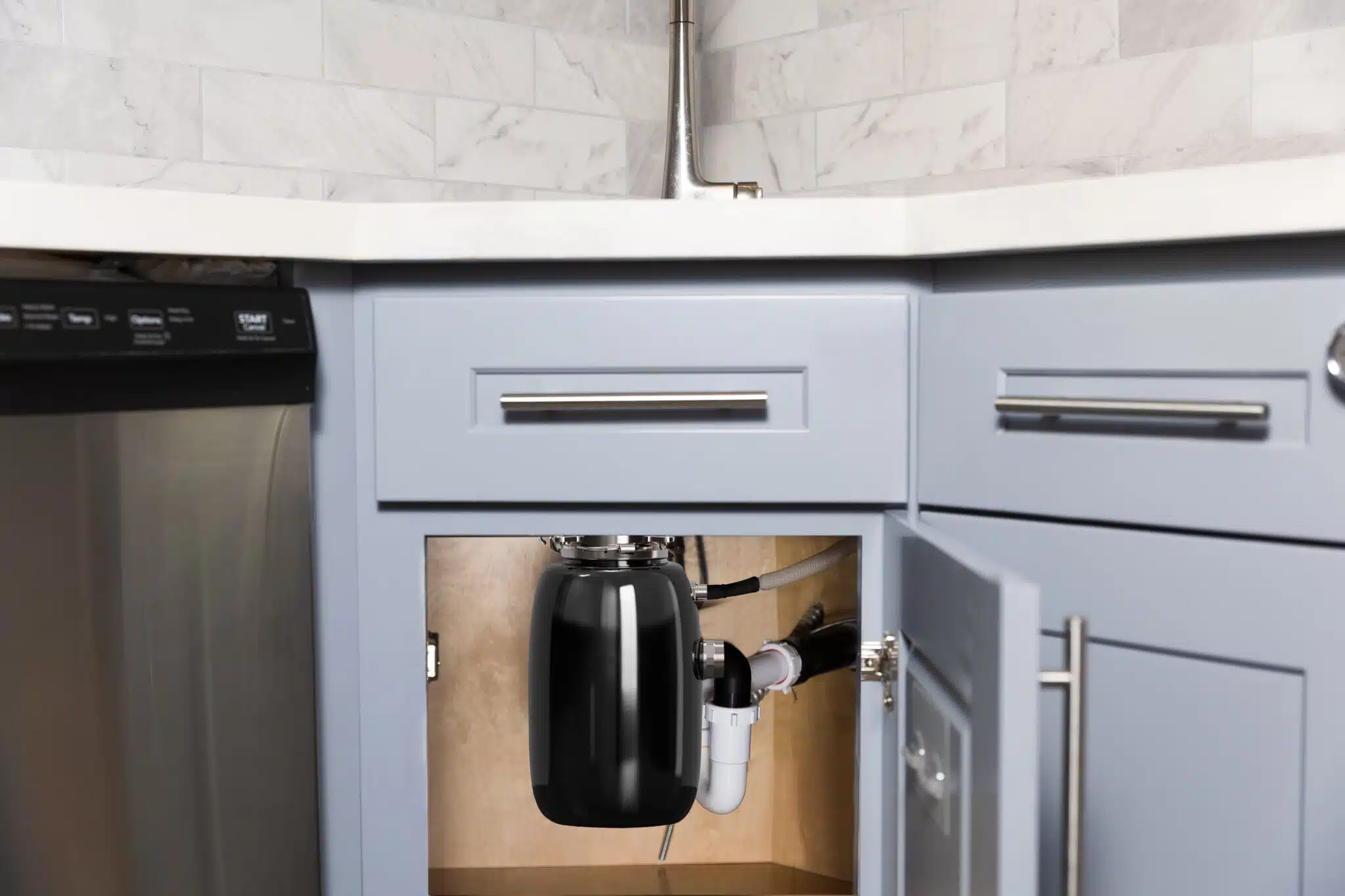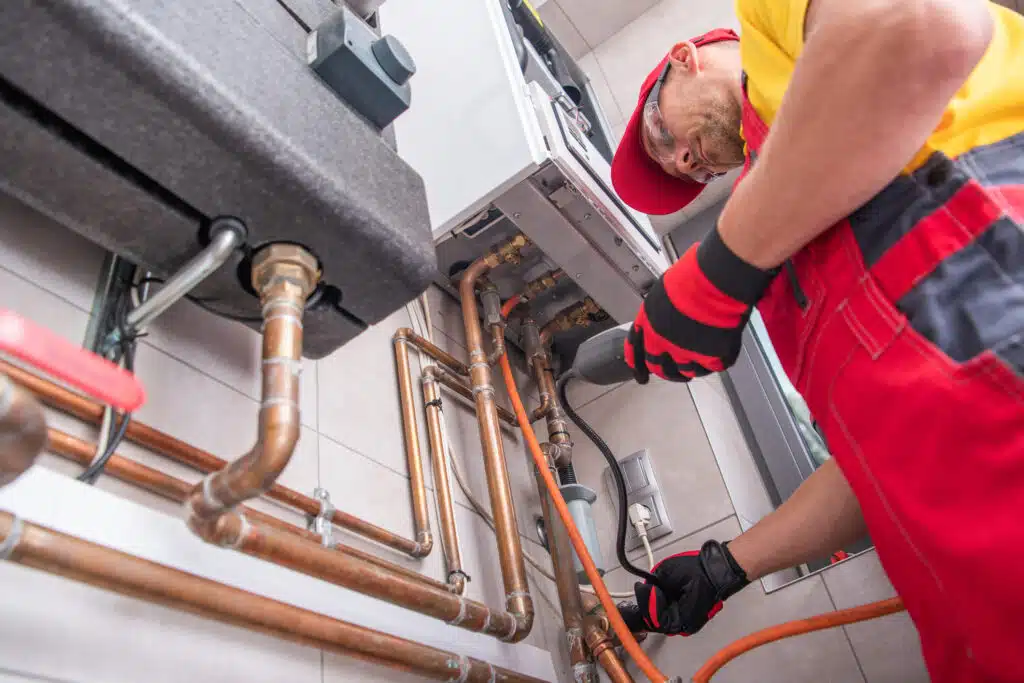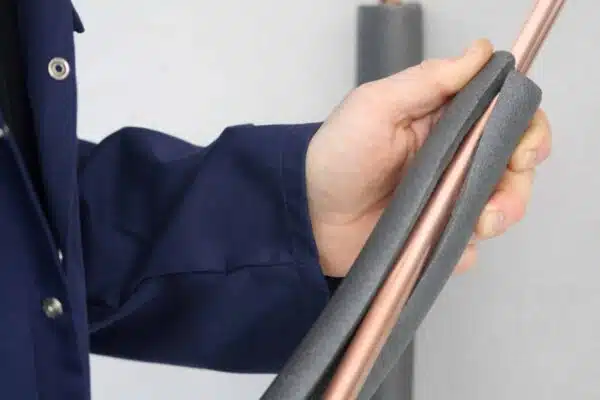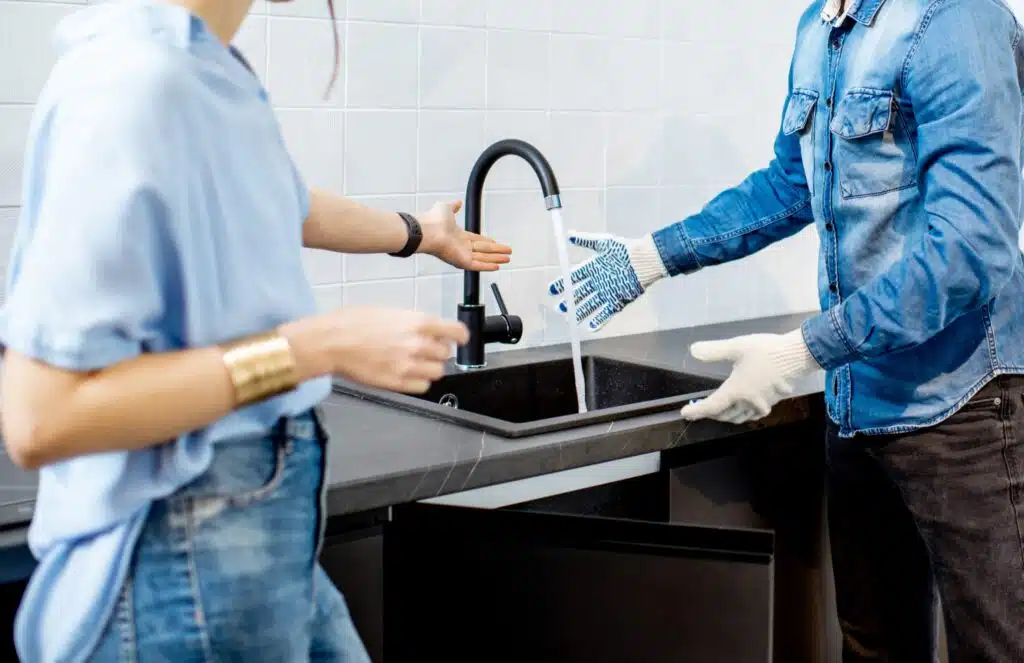Garbage disposal repair is essential for keeping your kitchen clean and efficient. It helps break down food waste, prevents clogged drains, and reduces unpleasant odors. However, like any other appliance, it can develop issues over time.
Spring is a busy season for many homeowners in Lancaster, PA. With spring cleaning, holiday gatherings, and outdoor cookouts, your garbage disposal may see increased use. If your unit starts showing signs of trouble, prompt garbage disposal repair can prevent costly plumbing problems and keep your kitchen running smoothly.
In this guide, we’ll explore six common warning signs that your garbage disposal needs professional attention. Addressing these issues early can save you from unexpected breakdowns and potential water damage. Let’s dive in!
Unusual Noises from the Garbage Disposal
What Noises Indicate a Problem?
A properly functioning garbage disposal should operate with a steady, low humming sound. However, if your unit suddenly starts making loud or unusual noises, it’s a sign that something is wrong. Some of the most common noises to listen for include:
- Rattling or Clanking: Could indicate that a hard object, such as a piece of silverware or a bone, is stuck in the disposal.
- Grinding or Screeching: May mean that the disposal’s internal components, such as the impellers or grinding ring, are worn out or misaligned.
- Humming Without Grinding: Suggests that the motor is jammed and struggling to spin the flywheel.
Common Causes of Strange Noises
- Foreign Objects: Sometimes, small items like bottle caps, utensils, or plastic fragments fall into the disposal, causing loud clanking or rattling sounds.
- Loose or Worn-Out Impellers: The impellers inside your disposal help grind food, but over time, they can become loose or misaligned, leading to excessive noise.
- Damaged Motor Bearings: If the motor’s bearings are wearing out, the disposal may produce a high-pitched screeching noise when running.
Ignoring these sounds can result in severe motor damage, leading to costly repairs or even full replacement. If your garbage disposal starts making unusual noises, turn it off immediately and call a professional plumber in Lancaster, PA to inspect and fix the problem.
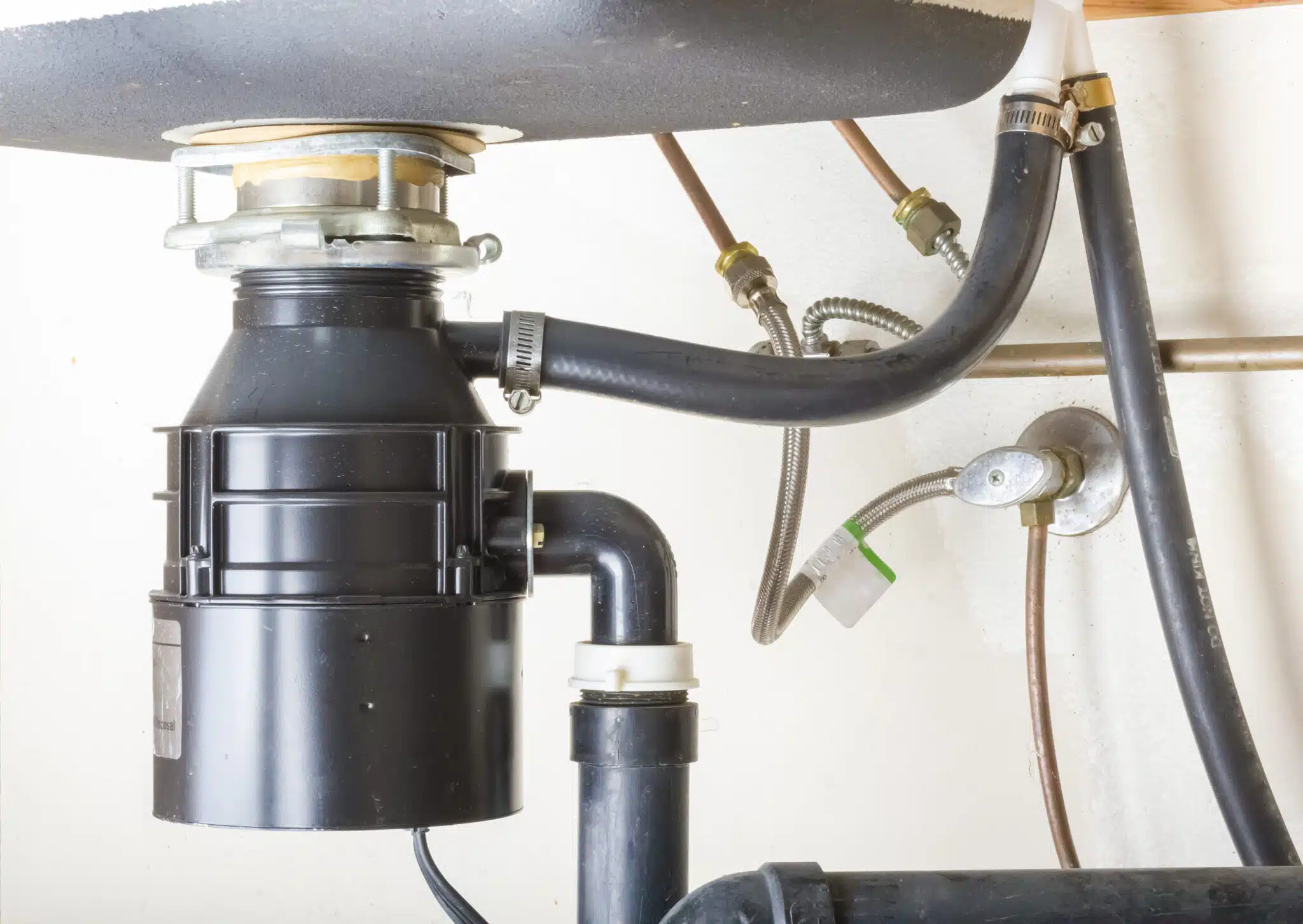
Slow Draining or Standing Water
A garbage disposal should quickly break down food waste and allow water to flow smoothly down the drain. If you notice slow drainage or standing water in your sink, it could indicate a problem with your disposal or connected plumbing. This issue often results from food particles, grease buildup, or foreign objects creating a blockage.
One common cause is grease and oil accumulation. When poured down the drain, grease hardens over time, restricting water flow. Additionally, fibrous foods like celery, potato peels, and coffee grounds can form stubborn clogs. These materials don’t break down easily and may collect inside the disposal or pipes.
Another possible issue is a partial disposal failure. If the unit’s grinding mechanism is worn out or damaged, it may struggle to process food waste efficiently. This can lead to clogged pipes and slow drainage. In some cases, a malfunctioning disposal can push waste back into the sink instead of sending it down the drain.
Ignoring slow drainage can result in bigger plumbing problems, including foul odors and potential backups. If water lingers in your sink after running the disposal, it’s best to seek professional garbage disposal repair in Lancaster, PA before the issue worsens. A trained plumber can identify the root cause and restore proper drainage.
Persistent Bad Odors
A lingering foul smell coming from your garbage disposal is more than just unpleasant—it can signal a problem. While occasional odors are normal, persistent bad smells may indicate trapped food particles, bacterial growth, or a malfunctioning disposal unit.
Food waste can sometimes get stuck in hard-to-reach areas inside the disposal, where it begins to decompose. This can create strong odors that don’t go away, even after running water or using cleaning agents. Grease and oil buildup can also contribute to the issue by coating the disposal’s interior and trapping food particles.
If cleaning your disposal with mild soap, ice cubes, or citrus peels doesn’t eliminate the smell, the issue could be more serious. A failing motor, worn-out seals, or clogged drain lines may prevent food waste from being properly processed and flushed away. In such cases, professional garbage disposal repair is necessary to restore functionality and eliminate odors at the source.
Ignoring persistent odors can lead to bacterial growth and attract pests like fruit flies. If your disposal continues to emit unpleasant smells despite regular cleaning, contact a plumbing expert in Lancaster, PA to diagnose and fix the issue. A quick repair can help maintain a fresh and hygienic kitchen.
Frequent Resets Required
Most garbage disposals have a built-in reset button to restart the unit after an overload or jam. Pressing this button occasionally is normal, but if you find yourself using it frequently, it could be a sign that your unit needs a garbage disposal repair. Ignoring this issue can lead to more significant damage, including motor failure or complete system breakdown.
Why Does Your Garbage Disposal Keep Resetting?
There are several reasons why your garbage disposal may require frequent resets:
- Overworked Motor – If your disposal is struggling to grind food waste, the motor may overheat and trip the safety switch. This often happens when the system is clogged, the grinding components are worn out, or the motor is nearing the end of its lifespan.
- Jammed Flywheel – The flywheel is responsible for spinning the grinding components. If food debris or mechanical failure causes it to get stuck, the disposal may shut off repeatedly. Resetting the unit might temporarily fix the issue, but the problem will likely return without professional garbage disposal repair.
- Electrical Issues – Faulty wiring, a failing power supply, or loose connections can cause your disposal to shut off unexpectedly. These problems may not be visible, but they can disrupt your unit’s performance and pose safety risks.
When to Call for Garbage Disposal Repair
Repeated resets are a clear warning sign that your garbage disposal isn’t functioning correctly. If your unit continues shutting down, it’s best to schedule a garbage disposal repair with a professional plumber in Lancaster, PA. A trained technician can diagnose the root cause, whether it’s an electrical issue, a failing motor, or worn-out grinding components.
Addressing the problem early can prevent costly repairs, extend the life of your disposal, and keep your kitchen running smoothly. Don’t wait until your disposal stops working completely—contact a professional for garbage disposal repair before a small issue turns into a major breakdown.
Leaks Under the Sink
Water pooling under your sink is never a good sign. If you notice moisture, puddles, or even mold growth near your garbage disposal, a leak may be to blame. Over time, disposals can develop leaks due to worn-out seals, loose connections, or cracks in the unit itself.
One common source of leaks is the flange—the part that connects the disposal to the sink drain. If the mounting screws become loose or the plumber’s putty wears away, water can start seeping through. Another potential issue is a damaged internal seal. The disposal has several rubber gaskets that prevent leaks, but these seals can wear down over time.
Cracks in the disposal housing are another possible cause. If the unit is old or has sustained damage, small fractures can form, allowing water to escape. Unfortunately, once the housing is cracked, replacement is usually the only solution.
Ignoring a garbage disposal leak can lead to serious issues, including cabinet damage, mold growth, and higher water bills. If you suspect a leak, turn off the disposal, check for visible damage, and contact a professional plumber in Lancaster, PA. A timely garbage disposal repair can prevent further water damage and keep your kitchen dry and functional.
Garbage Disposal Won’t Turn On
A garbage disposal that won’t turn on is one of the most obvious signs that you need a garbage disposal repair. While a simple reset may fix the issue, persistent power failures often indicate deeper problems that require professional attention. If your disposal remains unresponsive, identifying the root cause is crucial to restoring its functionality.
Common Electrical Issues That Prevent Your Garbage Disposal from Turning On
One common reason for a non-working unit is an electrical issue. Your garbage disposal relies on a steady power supply to function, and disruptions can prevent it from starting. Here are a few electrical problems that might be to blame:
- Tripped Circuit Breaker: If your disposal suddenly stops working, check your home’s electrical panel. A tripped breaker could be cutting power to the unit. Resetting the breaker may restore function.
- Loose Power Connection: Sometimes, the disposal’s plug can become loose or disconnected. Ensure the unit is securely plugged into a working outlet.
- Faulty Wall Switch or Wiring Issues: If your disposal is connected but still doesn’t turn on, the wall switch may be faulty. Additionally, damaged wiring inside the unit or outlet could be preventing power from reaching the motor.
If you’ve checked these basic troubleshooting steps and the disposal still won’t work, it’s best to call a garbage disposal repair specialist to inspect the electrical components. Attempting electrical repairs yourself can be dangerous and may cause further damage.
A Burned-Out Motor May Require Garbage Disposal Repair
If your garbage disposal hums when you turn it on but doesn’t actually run, the motor could be failing. Over time, wear and tear can cause the motor to overheat, seize up, or burn out completely. Some common causes of motor failure include:
- Jammed Impellers: If hard objects like bones, fruit pits, or silverware get stuck inside, the motor may overheat and stop working.
- Overuse and Age: Older garbage disposals may struggle to handle heavy loads, causing the motor to wear out faster.
- Lack of Maintenance: Regular cleaning and proper use extend the lifespan of your disposal, but neglecting maintenance can accelerate motor failure.
In many cases, if the motor has completely burned out, a full garbage disposal repair or even a replacement may be necessary. A professional plumber in Lancaster, PA, can determine whether repairing the motor is cost-effective or if upgrading to a new unit is the better option.
Blades Aren’t Effectively Grinding Food Waste
Your garbage disposal repair needs may become obvious when food scraps aren’t breaking down properly. A functioning unit should grind waste into small particles that easily wash away. However, if food lingers in the sink or takes longer to drain, your disposal’s blades may be dull or worn out.
Dull blades can reduce the efficiency of your system, leading to frequent clogs and slow drainage. Over time, grinding food waste can wear down the impellers, making it harder for the unit to process tougher items like vegetable peels or small bones. Many people think adding ice cubes will sharpen the blades, but this is a common misconception. Garbage disposals don’t have sharp blades—they use impellers to break down waste.
If your unit isn’t effectively grinding food, garbage disposal repair may be necessary. A professional plumber can assess whether the blades need maintenance or if the entire system needs a replacement. Ignoring this issue could lead to blockages in your pipes, unpleasant odors, and unnecessary strain on your plumbing. Scheduling a garbage disposal repair early can help prevent costly damage and keep your kitchen running efficiently.
Water Backing Up into the Sink
If you notice water pooling in your sink when you run the garbage disposal, it’s a clear sign that you may need a garbage disposal repair. A properly functioning disposal should quickly grind food waste and send it down the drain. But when water backs up, it usually means there’s a clog or blockage preventing proper drainage.
Food particles, grease buildup, and even small objects can create obstructions in the disposal or pipes. Over time, these blockages can cause slow draining and lead to standing water in your sink. In some cases, the problem extends beyond the disposal and into the main drain line, which may require professional plumbing assistance. If left unaddressed, the issue could worsen, making garbage disposal repair even more urgent.
Ignoring this issue can result in foul odors, bacterial growth, and potential water damage under your sink. If plunging or flushing the disposal with cold water doesn’t help, it’s best to schedule a garbage disposal repair with a trusted plumber. Timely garbage disposal repair ensures your kitchen sink remains functional and prevents larger plumbing issues down the road. If your disposal continues to back up even after repairs, you may need a professional inspection to determine if a replacement is necessary.
Increased Energy Bills Due to Overworked Motor
A garbage disposal repair may be necessary if you notice a sudden rise in your energy bills. Your garbage disposal should run efficiently, using minimal electricity to break down food waste. However, when the unit struggles to grind food properly, it can consume more power than usual, causing an increase in energy costs.
An overworked motor is often the result of internal wear, clogged impellers, or electrical issues. If the grinding components are dull or blocked, the disposal has to work harder, using more electricity in the process. In some cases, electrical malfunctions can also force the unit to draw excessive power. Without proper garbage disposal repair, the problem can worsen over time, leading to expensive energy bills and potential unit failure.
If your garbage disposal is taking longer to break down food waste or running sluggishly, it’s a sign that it needs servicing. A professional garbage disposal repair can restore its efficiency by fixing internal components, clearing blockages, or addressing electrical concerns. However, if the motor is worn out, replacing the unit with an energy-efficient model may be the best option. Scheduling timely garbage disposal repair helps prevent unexpected breakdowns and keeps your utility costs under control.

FAQs About Garbage Disposal Repair
1. How long does a garbage disposal typically last?
Most units last between 8 to 15 years, depending on usage and maintenance. Regular cleaning, avoiding improper waste disposal, and scheduling professional inspections can extend its lifespan.
2. What foods should never go down the disposal?
Avoid putting fibrous foods like celery, banana peels, and corn husks into the disposal. Starchy foods, such as pasta and potato peels, can also cause clogs. Additionally, grease, coffee grounds, and eggshells can contribute to buildup in the pipes.
3. Can I fix my garbage disposal myself?
While simple issues like pressing the reset button or removing small blockages can be handled by homeowners, more complex problems—such as electrical malfunctions, leaks, or grinding failures—require professional attention.
4. How can I prevent clogs in my disposal?
Run cold water while using the disposal and for several seconds afterward to flush out food particles. Cutting food scraps into smaller pieces before grinding can also help. Regularly cleaning the unit with a mixture of baking soda and vinegar can reduce buildup and odors.
5. When should I replace my garbage disposal instead of repairing it?
If your unit frequently jams, makes loud noises, leaks, or has required multiple repairs, replacement might be the better option. A failing motor or worn-out components can make repairs ineffective in the long run.

